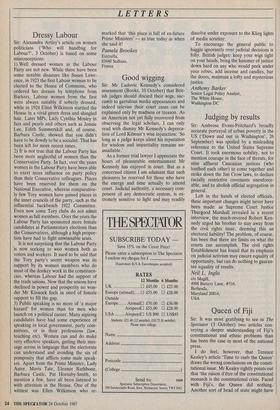Judging by results
Sir: Ambrose Evans-Pritchard's broadly accurate portrayal of urban poverty in the US Mown and out in Washington', 26 September) was spoiled by a misleading reference to the United States Supreme Court. It took enormous nobility, not to mention courage in the face of threats, for nine affluent Caucasian justices (who loathed each other) to come together and strike down the Jim Crow laws, to declare racially restrictive covenants unenforce- able, and to abolish official segregation in general.
Left in the hands of elected officials, these important changes might never have been made: as Supreme Court Justice Thurgood Marshall revealed in a recent interview, the much-revered Robert Ken- nedy urged his brother to stay away from the civil rights issue, deeming this an electoral liability! The problem, of course, has been that there are limits on what the courts can accomplish. The civil rights Establishment has found that its emphasis on judicial activism may ensure equality of opportunity, but can do nothing to guaran- tee equality of results.
Neil L. Inglis
do Magill, 4998 Battery Lane, #516, Bethesda, Maryland 20814, USA


















































 Previous page
Previous page